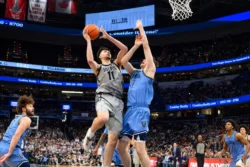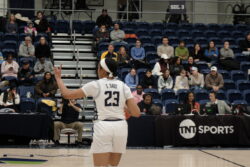Have some aggression to work out and would like to learn how to curse in Spanish? You’d be sure to find a home on the rugby team Alicante, Spain.
Maybe neither of these interest you, but your two loves are soccer and tea. Well, play for the soccer team at Oxford and all your dreams will come true—at the yearly Varsity Game against Cambridge there is a post-game tea party. Pinkies up, bloke!
These experiences were had by Georgetown students last year who decided to work athletics into their term abroad. And these aren’t just memberships to Euro-gyms where you get caught up trying to convert the metric system while lifting weights or smoking cigarettes on the treadmill just to fit in. These were real, live college squads, complete with practice schedules and eight-hour road trips.
Alex Parkhouse (COL ‘08) is a senior on the Hoyas’ dominant rugby team that has its eyes set on the National tournament in Florida this year. If the team gets that far into the post-season they will literally have to sell chocolate so that they can pay for the trip (the coach makes chocolate when he’s not teaching form tackles). In Alicante, Parkhouse never had that problem. Rugby teams abroad are treated almost as professionals.
“It was really serious stuff,” said the hulking Parkhouse, who stands over six feet. “We got a charter bus to games, hotels arranged by the school and the school gets money from the state if it places well. So they just were throwing money at the rugby program. They paid us for winning, too. We got 200 euros for winning regionals and then 1200 for placing third in nationals.”
He laughed at the would-be NCAA violation, but that wasn’t his only reason for playing. He wasn’t really abroad for the travel, either. Hailing from southeast England, he had already seen many of the places his American classmates were skirting off to for long weekends.
“I wanted something I could use to really improve my Spanish,” said Parkhouse, who practiced with the team four days a week. “Going off and playing rugby, it was literally me and the Spanish kids. And it wasn’t just Spanish kids; there were Argentines, French and Italians, so it was a great setting.”
Anne Fauvre (CAS ’08) went into her soccer experience at Oxford as a relaxed commitment, playing the equivalent of intermural soccer to start.
“None of them had really even kicked a ball before,” said Fauvre who played goalie for her high school team in Los Angeles. “They were just impressed that I knew how to catch.”
Eventually she was asked by the “Blues” team (the equivalent of American varsity) to play goalie because they saw her dive for a ball—a rarity in girls soccer across the pond.
“Girls soccer is kind of considered the real butch sport there, which is really awful, so not a lot of girls play it,” Fauvre said. “There’s a real stigma for whatever reason playing soccer as a girl over there. It was hard getting fields, and the boys were always favored over us. I never realized how different sports are for girls in the U.S. until I got over there. Soccer is the working-class sport in England, so maybe it’s because they want girls to be more prim and proper.”
She played for the Blues team all year and helped take them to the semi-finals of the British University Sports Association national tournament, but it wasn’t all tea and crumpets for Fauvre. Everyone spoke English, but she still couldn’t avoid the language barrier that came along with playing “football.”
“Well there was one time where I did say I was going to shag the balls at practice—I’m going to go grab them,” Fauvre said. “But over there ‘shagging’ means something else, so they all thought that was the funniest thing.”





